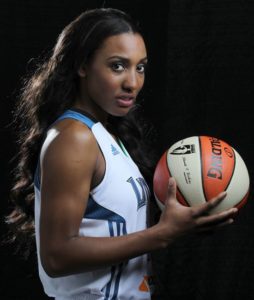by WorldTribune Staff, February 22, 2017
A former WNBA player said she was targeted for being “heterosexual” and that her “spirit was being broken” during her immersion in the league’s “toxic” culture.
Candice Wiggins, a college star at Stanford, the third pick of the 2008 WNBA draft and a 2011 champion with Minnesota, retired in 2015 after saying she was no longer willing to endure the “very, very harmful” culture running through the WNBA.

“People were deliberately trying to hurt me all of the time,” Wiggins said in an interview with the San Diego Tribune published on Feb. 20.
“I wanted to play two more seasons of WNBA, but the experience didn’t lend itself to my mental state. It was a depressing state in the WNBA. It’s not watched. Our value is diminished. It can be quite hard. I didn’t like the culture inside the WNBA, and without revealing too much, it was toxic for me. … My spirit was being broken.”
Wiggins, who played for the Minnesota Lynx, Tulsa Shock, Los Angeles Sparks and New York Liberty, said she “had never been called the B-word so many times in my life than I was in my rookie season. I’d never been thrown to the ground so much. The message was: ‘We want you to know we don’t like you.’ ”
Wiggins, who said a huge majority of players in the league are lesbian, said she could no longer take the constant harassment she received for being straight.
“Me being heterosexual and straight, and being vocal in my identity as a straight woman was huge,” Wiggins said. “I would say 98 percent of the women in the WNBA are gay women. It was a conformist type of place. There was a whole different set of rules they [the other players] could apply.”
Wiggins, 30, told the Tribune she was disheartened by a culture in the WNBA that encouraged women to look and act like the men in the NBA.
“It comes to a point where you get compared so much to the men, you come to mirror the men,” she said. “So many people think you have to look like a man, play like a man to get respect. I was the opposite. I was proud to a be a woman, and it didn’t fit well in that culture.”
Wiggins said, in a league that “nobody cares about,” there was “a lot of jealousy and competition, and we’re all fighting for crumbs. The way I looked, the way I played – those things contributed to the tension.”
Of the league as a whole, Wiggins said, “viewership is minimal. Ticket sales are very low. They give away tickets and people don’t come to the game.”
The 12-team WNBA is subsidized by the NBA.
